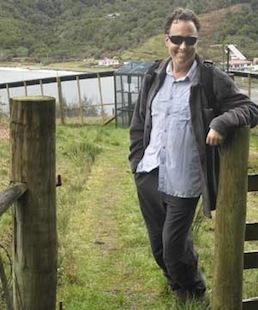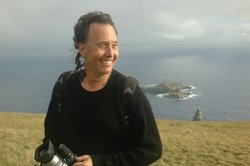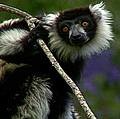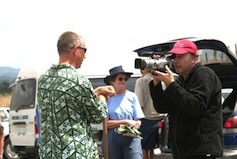Animal Tales with Randy Grim
07/01/09 16:10
Animal Tales
with Randy Grim | Clear Channel
Randy Grim talks with Dr. Michael Tobias about the urgent need to protect all life and preserve biodiversity.
» Listen
Randy Grim talks with Dr. Michael Tobias about the urgent need to protect all life and preserve biodiversity.
» Listen
Studio Tulsa with Rich Fisher
24/12/08 13:43
Studio Tulsa
with Rick Fisher | KWGS-FM
Rick Fisher talks with Dr. Michael Tobias and Jane Gray Morrison about their new book SANCTUARY and new feature documentary HOTSPOTS, both dedicated to raising awareness around the current mass extinction and worldwide efforts to stop it.
» Listen
Rick Fisher talks with Dr. Michael Tobias and Jane Gray Morrison about their new book SANCTUARY and new feature documentary HOTSPOTS, both dedicated to raising awareness around the current mass extinction and worldwide efforts to stop it.
» Listen
Biophilia, anyone?
03/12/08 19:32
The
Southland Times | New Zealand
 Stewart Island's
global significance has been highlighted in
internationally acclaimed ecologist,
historian, anthropologist, explorer, author
and film-maker Michael Tobias' latest film
and book. Southland Times reporter Amy Milne
spent a day with one of the natural world's
renaissance men.
Stewart Island's
global significance has been highlighted in
internationally acclaimed ecologist,
historian, anthropologist, explorer, author
and film-maker Michael Tobias' latest film
and book. Southland Times reporter Amy Milne
spent a day with one of the natural world's
renaissance men.
A fly is buzzing at the window of the Church Hill Cafe on Stewart Island as Michael Tobias sits down for lunch.
He quickly acts to save it, cupping his hand around it and gently scooping it towards the window he's opened to set it free.
"Everything is precious," he says.
» More
 Stewart Island's
global significance has been highlighted in
internationally acclaimed ecologist,
historian, anthropologist, explorer, author
and film-maker Michael Tobias' latest film
and book. Southland Times reporter Amy Milne
spent a day with one of the natural world's
renaissance men.
Stewart Island's
global significance has been highlighted in
internationally acclaimed ecologist,
historian, anthropologist, explorer, author
and film-maker Michael Tobias' latest film
and book. Southland Times reporter Amy Milne
spent a day with one of the natural world's
renaissance men.
A fly is buzzing at the window of the Church Hill Cafe on Stewart Island as Michael Tobias sits down for lunch.
He quickly acts to save it, cupping his hand around it and gently scooping it towards the window he's opened to set it free.
"Everything is precious," he says.
» More
Heaven On Earth
23/11/08 13:45
Mindfood |
Australia
by Michael Tobias & Jane Gray Morrison
Throughout the world, there are places where Mother Nature is honoured and protected. These sanctuaries are a step towards conserving our biosphere.
 AUSTRALIA -
For most of our lives we have searched the
world for those rare places where humans
have worked passionately to save remnants of
the original Eden. There are, as it turns
out, more than 114,000 protected areas on
Earth. Some of them are enormous, such as
Alaska’s Wrangell St Elias, the largest
national park in the US at over 5.3 million
hectares. Others are as tiny as the hectare
comprising one of Japan’s most symbolic
sanctuaries, the sand garden of Ryoan-ji, a
UNESCO World Heritage Site, in Kyoto’s
remarkable greenbelt.
AUSTRALIA -
For most of our lives we have searched the
world for those rare places where humans
have worked passionately to save remnants of
the original Eden. There are, as it turns
out, more than 114,000 protected areas on
Earth. Some of them are enormous, such as
Alaska’s Wrangell St Elias, the largest
national park in the US at over 5.3 million
hectares. Others are as tiny as the hectare
comprising one of Japan’s most symbolic
sanctuaries, the sand garden of Ryoan-ji, a
UNESCO World Heritage Site, in Kyoto’s
remarkable greenbelt.
What these protected areas share is the critical and timely lesson that celebrating nature may be the key to our future survival as a species, not to mention the survival of millions of other species that share this miraculous planet with us.
» More
by Michael Tobias & Jane Gray Morrison
Throughout the world, there are places where Mother Nature is honoured and protected. These sanctuaries are a step towards conserving our biosphere.
 AUSTRALIA -
For most of our lives we have searched the
world for those rare places where humans
have worked passionately to save remnants of
the original Eden. There are, as it turns
out, more than 114,000 protected areas on
Earth. Some of them are enormous, such as
Alaska’s Wrangell St Elias, the largest
national park in the US at over 5.3 million
hectares. Others are as tiny as the hectare
comprising one of Japan’s most symbolic
sanctuaries, the sand garden of Ryoan-ji, a
UNESCO World Heritage Site, in Kyoto’s
remarkable greenbelt.
AUSTRALIA -
For most of our lives we have searched the
world for those rare places where humans
have worked passionately to save remnants of
the original Eden. There are, as it turns
out, more than 114,000 protected areas on
Earth. Some of them are enormous, such as
Alaska’s Wrangell St Elias, the largest
national park in the US at over 5.3 million
hectares. Others are as tiny as the hectare
comprising one of Japan’s most symbolic
sanctuaries, the sand garden of Ryoan-ji, a
UNESCO World Heritage Site, in Kyoto’s
remarkable greenbelt.
What these protected areas share is the critical and timely lesson that celebrating nature may be the key to our future survival as a species, not to mention the survival of millions of other species that share this miraculous planet with us.
» More
The Race Against Extinction
19/11/08 11:32
2
Magazine | Asia
By François Oosthuizen
 BANGKOK -
The protection of biodiversity is now the
biggest issue on Earth – much bigger than
global warming. We are currently witnessing
the sixth major extinction event in the
history of our planet, and the greatest
since the dinosaurs disappeared, 65 million
years ago. The co-producer of a new
television documentary that takes cameras
deep inside critical conservation areas
around the world spoke exclusively to
2magazine while on a brief stopover in
Bangkok.
BANGKOK -
The protection of biodiversity is now the
biggest issue on Earth – much bigger than
global warming. We are currently witnessing
the sixth major extinction event in the
history of our planet, and the greatest
since the dinosaurs disappeared, 65 million
years ago. The co-producer of a new
television documentary that takes cameras
deep inside critical conservation areas
around the world spoke exclusively to
2magazine while on a brief stopover in
Bangkok.
» More
By François Oosthuizen
 BANGKOK -
The protection of biodiversity is now the
biggest issue on Earth – much bigger than
global warming. We are currently witnessing
the sixth major extinction event in the
history of our planet, and the greatest
since the dinosaurs disappeared, 65 million
years ago. The co-producer of a new
television documentary that takes cameras
deep inside critical conservation areas
around the world spoke exclusively to
2magazine while on a brief stopover in
Bangkok.
BANGKOK -
The protection of biodiversity is now the
biggest issue on Earth – much bigger than
global warming. We are currently witnessing
the sixth major extinction event in the
history of our planet, and the greatest
since the dinosaurs disappeared, 65 million
years ago. The co-producer of a new
television documentary that takes cameras
deep inside critical conservation areas
around the world spoke exclusively to
2magazine while on a brief stopover in
Bangkok.
» More
Sanctuary: The Passionate People Protecting The Planet
01/11/08 11:22
Prime Time Focus
AARP Radio - All around the world people who really care about animals and the environment are making a difference. Now a new book called Sanctuary picks some of the places where one person, through unfailing devotion, has changed things for the better. The authors have also made a stunning movie called Hot Spots that airs on November 2nd on PBS stations.
Prime Time Focus host Alyne Ellis reports on a book and television show with a clear focus - proving that dedicated people can make a difference when it comes to saving the fragile parts of our planet. Watch the preview of the PBS documentary Hot Spots, and then listen to Alyne's report on the film, and the new book Sanctuary.
Michael Tobias and Jane Morrison are the creative force behind the film and book. They run the Dancing Star Foundation, which has the goal of "helping humankind protect the natural world." Find out more, and learn how you can become involved with the links below.
» Click here to listen online
» Click here to download MP3
AARP Radio - All around the world people who really care about animals and the environment are making a difference. Now a new book called Sanctuary picks some of the places where one person, through unfailing devotion, has changed things for the better. The authors have also made a stunning movie called Hot Spots that airs on November 2nd on PBS stations.
Prime Time Focus host Alyne Ellis reports on a book and television show with a clear focus - proving that dedicated people can make a difference when it comes to saving the fragile parts of our planet. Watch the preview of the PBS documentary Hot Spots, and then listen to Alyne's report on the film, and the new book Sanctuary.
Michael Tobias and Jane Morrison are the creative force behind the film and book. They run the Dancing Star Foundation, which has the goal of "helping humankind protect the natural world." Find out more, and learn how you can become involved with the links below.
» Click here to listen online
» Click here to download MP3
Interview with Dr. Michael Tobias
24/10/08 15:52
Radio New
Zealand
Dr Michael Tobias is an ecologist, historian, filmmaker and author. He is also a leading light in the 'sanctuary' movement.
» Click here to listen online
Dr Michael Tobias is an ecologist, historian, filmmaker and author. He is also a leading light in the 'sanctuary' movement.
» Click here to listen online
Conservationist to attend Celebration of Books
25/09/08 16:05
TULSA WORLD
By James D. Watts, Jr., World Scene Writer
 Oklahoma was one of the
places considered for the film "Hotspots."
That the state failed to end up in the
finished documentary, however, is a good
thing in the eyes of Michael Tobias.
Oklahoma was one of the
places considered for the film "Hotspots."
That the state failed to end up in the
finished documentary, however, is a good
thing in the eyes of Michael Tobias.
Tobias, the executive director of the Dancing Star Foundation, is a writer and filmmaker who has devoted himself to issues of conservation, wildlife preservation and bio-diversity.
Tobias, along with his wife and frequent collaborator Jane Gray Morrison, will be at the Oklahoma Center for Poets and Writers' Celebration of Books on Saturday. They will take part in panel discussions on wildlife and conservation in life and literature, and will host a screening of their latest film, "Hotspots," at 7 p.m. at the Circle Cinema, 10 S. Lewis Ave.
"A hot spot refers to a place on Earth — specifically on land — that contains at least 1,500 flowering plants endemic to the region, 70 percent of which are threatened with extinction," Tobias said, speaking by phone from New Zealand, where he is observing the re-introduction of two rare species of birds to an ecological preserve there.
» More
By James D. Watts, Jr., World Scene Writer
 Oklahoma was one of the
places considered for the film "Hotspots."
That the state failed to end up in the
finished documentary, however, is a good
thing in the eyes of Michael Tobias.
Oklahoma was one of the
places considered for the film "Hotspots."
That the state failed to end up in the
finished documentary, however, is a good
thing in the eyes of Michael Tobias.
Tobias, the executive director of the Dancing Star Foundation, is a writer and filmmaker who has devoted himself to issues of conservation, wildlife preservation and bio-diversity.
Tobias, along with his wife and frequent collaborator Jane Gray Morrison, will be at the Oklahoma Center for Poets and Writers' Celebration of Books on Saturday. They will take part in panel discussions on wildlife and conservation in life and literature, and will host a screening of their latest film, "Hotspots," at 7 p.m. at the Circle Cinema, 10 S. Lewis Ave.
"A hot spot refers to a place on Earth — specifically on land — that contains at least 1,500 flowering plants endemic to the region, 70 percent of which are threatened with extinction," Tobias said, speaking by phone from New Zealand, where he is observing the re-introduction of two rare species of birds to an ecological preserve there.
» More
Eco-warrior Michael Tobias
25/09/08 09:38
Radio Live New
Zealand
Auckland - Graeme Hill talks with Michael Tobias about the urgent need to step-up worldwide conservation efforts in critical conservation hotspots like New Zealand.
» Click here to listen online
Auckland - Graeme Hill talks with Michael Tobias about the urgent need to step-up worldwide conservation efforts in critical conservation hotspots like New Zealand.
» Click here to listen online
Hotspots revealed
15/09/08 09:07
Wild
Talk (IUCN/WWF)
 Geneva -
Wild Talk is taken on a magical mystery tour
of the world's hotspots by Michael Tobias,
who followed Russ Mittermeier during the
making of his film Hotspots. We travel from
Madasgcar to the city lights of Los Angeles
as Michael describes what the crew saw on
their way and discusses the importance of
conserving these wonderfully rich areas of
biodivserity.
Geneva -
Wild Talk is taken on a magical mystery tour
of the world's hotspots by Michael Tobias,
who followed Russ Mittermeier during the
making of his film Hotspots. We travel from
Madasgcar to the city lights of Los Angeles
as Michael describes what the crew saw on
their way and discusses the importance of
conserving these wonderfully rich areas of
biodivserity.
» Click here to listen online
 Geneva -
Wild Talk is taken on a magical mystery tour
of the world's hotspots by Michael Tobias,
who followed Russ Mittermeier during the
making of his film Hotspots. We travel from
Madasgcar to the city lights of Los Angeles
as Michael describes what the crew saw on
their way and discusses the importance of
conserving these wonderfully rich areas of
biodivserity.
Geneva -
Wild Talk is taken on a magical mystery tour
of the world's hotspots by Michael Tobias,
who followed Russ Mittermeier during the
making of his film Hotspots. We travel from
Madasgcar to the city lights of Los Angeles
as Michael describes what the crew saw on
their way and discusses the importance of
conserving these wonderfully rich areas of
biodivserity.
» Click here to listen online
Saving Species and Habitats
12/09/08 08:28
Radio New
Zealand
Auckland - Nine to Noon’s Kathryn Ryan interviews leading environmentalist, and environmental film maker, Michael Tobias who has just completed a mammoth 20-year film project.
» Click here to listen online
Auckland - Nine to Noon’s Kathryn Ryan interviews leading environmentalist, and environmental film maker, Michael Tobias who has just completed a mammoth 20-year film project.
» Click here to listen online
Man's erosion of Earth in focus
10/07/08 17:07
DAILY BREEZE |
LOS ANGELES
By Kristin S. Agostoni, Staff Writer
For three years, Michael Tobias traveled the globe documenting the daunting efforts under way to protect threatened plants and wildlife.
He's followed a stewardship program to protect an endangered parrot species in New Zealand and the native plantings occurring on Easter Island, once home to rich palm forests before humans ripped them from the landscape.
This weekend, the anthropologist, ecologist and filmmaker will bring those stories and others to the South Bay, which will get an early look at the new documentary he produced with his wife, fellow ecologist Jane Gray Morrison.
» More
By Kristin S. Agostoni, Staff Writer
For three years, Michael Tobias traveled the globe documenting the daunting efforts under way to protect threatened plants and wildlife.
He's followed a stewardship program to protect an endangered parrot species in New Zealand and the native plantings occurring on Easter Island, once home to rich palm forests before humans ripped them from the landscape.
This weekend, the anthropologist, ecologist and filmmaker will bring those stories and others to the South Bay, which will get an early look at the new documentary he produced with his wife, fellow ecologist Jane Gray Morrison.
» More
Film calls for conservation of life in biological hot spots
05/05/08 12:19
THE
DAILY BRUIN | LOS ANGELES
Seda Terzyan, Bruin contributor
With thousands of animal and plant species becoming extinct each day, many researchers call for a reversal of the destruction caused by human life to save the planet.
“Hotspots,” a new documentary being screened exclusively at UCLA tonight, attempts to remind people of the greatness of the planet they inhabit and the importance of conserving life for medical purposes. It takes viewers on an adventure through a handful of the 35 most biologically rich life zones on earth.
“Humans are causing massive extinctions across all taxa, but we can come together and reverse these effects just by saving the hot spots,” said professor Michael Tobias, the director of the film.
By making these locations a priority, conservation ecologists believe humans can affect the future of evolution on a large scale.
» More
Seda Terzyan, Bruin contributor
With thousands of animal and plant species becoming extinct each day, many researchers call for a reversal of the destruction caused by human life to save the planet.
“Hotspots,” a new documentary being screened exclusively at UCLA tonight, attempts to remind people of the greatness of the planet they inhabit and the importance of conserving life for medical purposes. It takes viewers on an adventure through a handful of the 35 most biologically rich life zones on earth.
“Humans are causing massive extinctions across all taxa, but we can come together and reverse these effects just by saving the hot spots,” said professor Michael Tobias, the director of the film.
By making these locations a priority, conservation ecologists believe humans can affect the future of evolution on a large scale.
» More
Maungatautari ratesplace on global map
04/12/07 19:12
WAIKATO TIMES |
NEW ZEALAND
By Jeff Neems
Waikato's ecological oasis, Maungatautari, features as one of the planet's 35 most biologically significant sites in a new international documentary to screen in Hamilton next week.
The New Zealand premier of Hotspots will be held at Waikato University's Gallagher Chamber (Wel Energy Trust Academy of Performing Arts) next Thursday, and will include a short talk by director Michael Tobias. He and co-director Jane Gray Morrison spent several weeks on Maungatautari last year filming for their documentary.
The 90-minute film, released earlier this year, covers efforts to save tens of thousands of species globally and 35 different locations considered Earth's most biologically important sites. The film took three years to make and covers some 20 years of research.
"From the trust perspective, we're delighted to have been chosen to show the premier," said Jim Mylchreest, Maungatautari Ecological Island Trust chief executive. "It's recognition of the importance of Maungatautari in terms of conservation issues in New Zealand and overseas."
» More
By Jeff Neems
Waikato's ecological oasis, Maungatautari, features as one of the planet's 35 most biologically significant sites in a new international documentary to screen in Hamilton next week.
The New Zealand premier of Hotspots will be held at Waikato University's Gallagher Chamber (Wel Energy Trust Academy of Performing Arts) next Thursday, and will include a short talk by director Michael Tobias. He and co-director Jane Gray Morrison spent several weeks on Maungatautari last year filming for their documentary.
The 90-minute film, released earlier this year, covers efforts to save tens of thousands of species globally and 35 different locations considered Earth's most biologically important sites. The film took three years to make and covers some 20 years of research.
"From the trust perspective, we're delighted to have been chosen to show the premier," said Jim Mylchreest, Maungatautari Ecological Island Trust chief executive. "It's recognition of the importance of Maungatautari in terms of conservation issues in New Zealand and overseas."
» More
A Stunning New Documentary
04/12/07 12:37
EPUBLISHERS
WEEKLY
 Hotspots is a new documentary
produced by the Dancing Star Foundation.
Hotspots is a new documentary
produced by the Dancing Star Foundation.
In Geeklish, a hotspot is a location that provides public Wi-Fi access. But talk with an ecologist, and you'll discover that a hotspot is a geographical location containing an immense diversity of animals, birds, or plants. The key to saving our planet is to protect and preserve these environmental hotspots.
The new film documents the latest and best efforts to save these essential places.
» More
 Hotspots is a new documentary
produced by the Dancing Star Foundation.
Hotspots is a new documentary
produced by the Dancing Star Foundation.
In Geeklish, a hotspot is a location that provides public Wi-Fi access. But talk with an ecologist, and you'll discover that a hotspot is a geographical location containing an immense diversity of animals, birds, or plants. The key to saving our planet is to protect and preserve these environmental hotspots.
The new film documents the latest and best efforts to save these essential places.
» More
Cameras Roll on Maungatautari
18/01/06 10:24
RED
ORBIT
By Lucy Reed
Still being established, Maungatautari Ecological Island is already considered a world leader.
 An American conservation
filmmaker says Maungatautari Ecological
Island Trust leads the world in mainland
islands and he wants to show it to the
world.
An American conservation
filmmaker says Maungatautari Ecological
Island Trust leads the world in mainland
islands and he wants to show it to the
world.
Michael Tobias has made more than 100 films and is currently shooting a two-hour film called Hot Spots, showcasing locations around the world where endangered species and "fragmented habitat are most severe", but where people and governments are rallying to prevent extinction.
Mr Tobias and his wife Jane Morrison are filming 18 locations around the country.
"One could film forever here. It's just the nature of a region with biodiversity."
» More
By Lucy Reed
Still being established, Maungatautari Ecological Island is already considered a world leader.
 An American conservation
filmmaker says Maungatautari Ecological
Island Trust leads the world in mainland
islands and he wants to show it to the
world.
An American conservation
filmmaker says Maungatautari Ecological
Island Trust leads the world in mainland
islands and he wants to show it to the
world.
Michael Tobias has made more than 100 films and is currently shooting a two-hour film called Hot Spots, showcasing locations around the world where endangered species and "fragmented habitat are most severe", but where people and governments are rallying to prevent extinction.
Mr Tobias and his wife Jane Morrison are filming 18 locations around the country.
"One could film forever here. It's just the nature of a region with biodiversity."
» More

